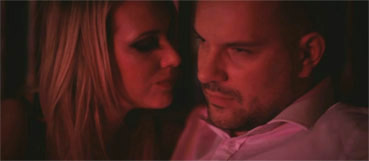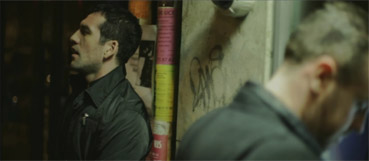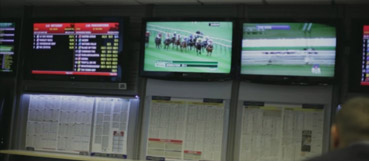| "Where's my life gone? Where's it going?" |
| Kevin Sampson, Awaydays (1998) |
British cinema has a longstanding love affair with crime films, and after social realism, heritage and the rom-com, it's arguably one of the strongest strands of our industry output. This special relationship goes all the way back to John Boulting's Brighton Rock and Alexander Mackendrick's The Ladykillers, right through to Matthew Vaughn's Layer Cake, which was released some fifty years after Brighton Rock and debuted in a more saturated but no less popular market.
The murky lure of the underworld has always been there, whether flashy and high-concept, such as Guy Ritchie's Lock Stock and Two Smoking Barrels or gritty and brutal, as in John Mackenzie's The Long Good Friday. Over the years, they've offered a snapshot of what it is to live in our nation and what constitutes our national identity: our fears and preoccupations, wants and desires, and who we are as people. That lure, that fascination, becomes all the more powerful when there's an element of truth to the story, typified by the concurrent popularity of true-crime cinema and/or biopics focussing on prominent figures such as Peter Mendak's The Krays and Nicolas Winding Refn's Bronson.

Combining both these traditions is Paul Tanter's The Rise & Fall of a White Collar Hooligan – the latest in a long and increasingly violent line of hooligan-oriented films that have maintained an enduring and enviable level of popularity with audiences. Treading a well-worn path, Hooligan brings with it a dark and brutal history, born from the terrace violence of the 1980s and '90s, that has been explored from various perspectives onscreen over the years, including Alan Clarke's landmark film The Firm (itself given the remake treatment by Nick Love in 2004), Phillip Davis' I.D., Julian Gilbey's Rise of the Footsoldier, Pat Holden's Awaydays, and most recently, John S. Baird's Cass. In such a crowded field, Hooligan has a great deal of work to do. Not only does it need to stand up to the iconic status of the films that have preceded it, but it also has to be attractive enough to capture attention of genre fans and new eyes alike, which, to some degree, it manages to achieve.
Based on a true story, Hooligan is Tanter's fifth film as a writer and third as a director, leads on from the success of his previous films, the neo-noir's Jack Says, Jack Said, and Jack Falls – informally known as The Jack Trilogy. Hooligan centres on Mike (Nick Nevern); a man down on his luck and struggling to find a job, he lives for the weekend, losing himself in his love for football. Amidst escalating post-match rivalries, he crosses paths with his old friend Eddie (Simon Philips, who also serves as a producer on the film), and after the two catch-up, Eddie offers Mike a job as a delivery driver. It looks as if Mike's luck's about to change, allowing him to support long-suffering girlfriend Katie (Rita Ramnani) and give her the kind of lifestyle he's always craved. However, Eddie's business isn't all that it seems, and he has his own boss, Mr Robinson (Billy Murray) to answer to. Things quickly get complicated, and Mike soon finds himself drawn into a credit card cloning scam. Soon a firm fixture of Eddie's gang, along with fellow runners Topbeef (Peter Barrett), Dan (David Tremaine) and Jamie (Amed Hashimi), Mike becomes less and less concerned with the consequences of their crime and evermore seduced by the trappings of his newfound wealth. However, when the gang take a trip to Paris for a Final, and test out their operation on French soil, the price Mike ends up paying is higher than he expects.

In truth, Hooligan isn't actually a film about hooliganism, and is more focussed on the business of criminality. Mike's hooligan tendencies are just a facet of his character, and it's clear that he's actually more interested in the game and following his beloved team than anything that happens afterward. It's almost as if he's playing up to the stereotype of a hooligan because that's what people expect of him – something reinforced by his unprofessional behaviour in various failed job interviews, reminiscent of the moral struggle at the heart of Peter Mullan's Neds. Far from being a ruthless thug, Mike's a likeable man and a principled one who backs away from violence instead of running toward it, even when deeply entrenched within the gang's activities, in contrast to the volatile temper and often ruthless behaviour displayed by Eddie whenever he's wronged.
Given the usual prevalence of violence with the genre, this stance is surprising, and may be a reflection of the negative attention it often attracts, especially when compared to earlier films such as Paul McGuigan's Gangster No.1 or Jonathan Glazer's Sexy Beast. This choice isn't just relegated to character traits, it also recurs within the construction of the film itself, guiding the decisions of Tanter and his editors Richard Colton and Andi Sloss. Rather than revel in and glorify the violence shown onscreen, a less is more approach is taken, giving enough information as to what's happening and is in-keeping with the world the film represents, but not so much that it becomes gratuitous.
Story-wise, there are obvious echoes of classic heist and caper films such as Mike Hodges' seminal Get Carter and Peter Collinson's The Italian Job, though Hooligan is not nearly as elaborate. There's some enjoyment to be had in watching Mike get away with his first few cash withdrawals – that guilt-free lawlessness is a foundation of the appeal of films like this – and seeing him grow in confidence. Indeed, the fact that the scam is one that taps into a very specific moral panic immediately makes the film that little bit more interesting and topical. Unfortunately, the quality of the story isn't wholly consistent. The best part is undoubtedly the 'rise' rather than the 'fall' of Mike's journey, and that's not just because the fall finds the film in darker territory; it simply runs out of steam, having used up the best of its ideas too early. The ending, when it arrives is abrupt, and compared to the care taken to lay out the earlier parts of the narrative, feels rushed. Unresolved endings can promote discussion and certainly leave the door ajar for sequel – one is reportedly in the works – but it doesn't make for a wholly satisfying viewing experience.

As a low-budget piece – the first from newly formed-independent production stable Chata Pictures, co-owned by well-regarded producers Simon Phillips and Jonathan Sothcott – it would be easy to dismiss Hooligan as the runt of the litter, cashing in on the appeal for the genre and its lucrative position in the home entertainment market. While it may not have the glamour or the slick aesthetic that its bigger budget cousins can afford, it's an abject lesson in what can be achieved with restricted financial resources, something of particular importance in our current economic climate, and for that Tanter and his team should be applauded. However, it's something of a double-edged sword. Business wise, Chata Pictures are very much bucking the trend; maintaining a steady output where other companies are thwarted by circumstance, struggling to find financial backing.
However, what's good for cinema as an industry isn't always good for cinema as an art. Despite its clear efforts to provide some fresh angles, the majority of what unfolds in Hooligan is cliché – strutting, brash cockney hard men in sharp suits who are handy with their fists – and its sometimes at the expense of what could've been a much more developed story, concerned with the consequences of greed and the moral implications surrounding credit card fraud's labelling as a so-called 'victimless' crime. These issues are alluded to, principally in Mike's early reticence to become involved in Eddie's plans, but as he's drawn further into the scam, and it begins to pay dividends, opening up his access to a better life both fiscally and socially, his principles go out the window. Honest, perhaps, but it's also something of a missed opportunity.
Though the creative team behind the film are clearly talented, Hooligan is let down by its unevenness, and often hackneyed dialogue, Yes, some of the behaviour the men display is for show, and posturing is part of that performance, but there are moments where the film is dangerously close to being unintentionally humorous, especially if you're well-versed in the genre. It detracts somewhat from the strength of Nevern and Phillips' performances and their onscreen dynamic, which, rightly, carries the film along. Matters aren't helped by Guy Ritchie influenced quick-cut montages to push forward the action and show the passage of time – showing Mike drawing money from an array of cash machines, for instance – or reliance on voiceover narration to explain plot points. When time is limited, it's a useful tool, but it's impossible not to hear echoes of Danny Dyer – who Nevern sounds so much like – whenever it appears, and draw comparisons between the two actors and the similarly-themed films they've appeared in.

Whether the film's reliance on such tired tropes is merely a by-product of supply and demand – in that audience expectations dictate what is shown on screen, so as to deviate would disappoint – or simply reflective of a lack of creative imagination is something of a thorny issue. It's easy to malign people for creating formulaic films, but difficult to find other avenues for those with less immediate appeal. Since, if the market is there – and sales figures prove it is, even if the critical opinion of such films remains less than favourable – they'll continue to be made. It's something of a vicious cycle, one that's made all the more difficult to break. In rallying against films like Hooligan purely on the basis of artistic merit, it becomes less about a particular film, and more a generalised debate about circulations of taste, and the tribal nature of low versus high art – something that can be as divisive and inflammatory as the battle lines drawn between one team of football supporters and another. When considered in such terms, Hooligan is very much an underdog, and on paper at least, it's the kind of film you want to support – like the hard-working local football team who have consistently bad luck despite flashes of potential – over more mainstream Hollywood fare. Nevertheless, its shortcomings don't make that an easy task.
Framed 2.35:1 and anamorphically enhanced, the transfer here is of the standard you'd expect from a modern, digitally edited and mastered (and possibly shot) feature. The picture is spotless, the detail very good for a non-HD picture (the first post-opening credits aerial shot is particularly eye-catching) and the contrast well balanced, at least within the restrictions imposed by the usual post-production picture tinkering, which softens the blacks in darker scenes. The colours are generally muted and several interiors have that commonly used earthy hue, though the rare sunlit daylight exteriors are close to natural.

The Dolby 5.1 surround track is clean and bright, but not quite as tonally lively as you might expect, and apart from the music and ambient effects heavily favours the front of the sound stage.
Audio Commentary
Featuring writer-director Paul Tanter, actor-producer Simon Phillips, lead actor Nick Nevern, and producer Jonathan Sothcott, this is certainly a busy track in terms of contributors and content. Discussion wise, it covers a lot of ground, but it's more like a gang of mates swapping stories in the pub than an analytical track. Tanter frequently wrangles the discussion, refocusing things towards the action onscreen when it veers off course. An interesting, if busy listen.
Trailer (1:27)
Constructed with the football elements at the beginning to draw you in, it certainly makes the most of its well-timed release date during last matches of Euro 2012, and manages to include that seat-filling favourite phrase 'based on a true story' early. A fairly even pitch for what the film's actually like, it goes along at a pace, and packs in a lot – a dash of fast cars, a side of snappily-dressed men in suits, and a decent slug of violence too. Quite the heady mix.
The Rise and Fall of a White Collar Hooligan is an uneven film, built around Nick Nevern and Simon Phillips' strong performances. The plot follows a well-worn path, but has moments of interest that bring something new. Fans of similar films or previous work from Nevern and writer-director Paul Tanter won't be disappointed, but anyone else may find it somewhat lacking.
|